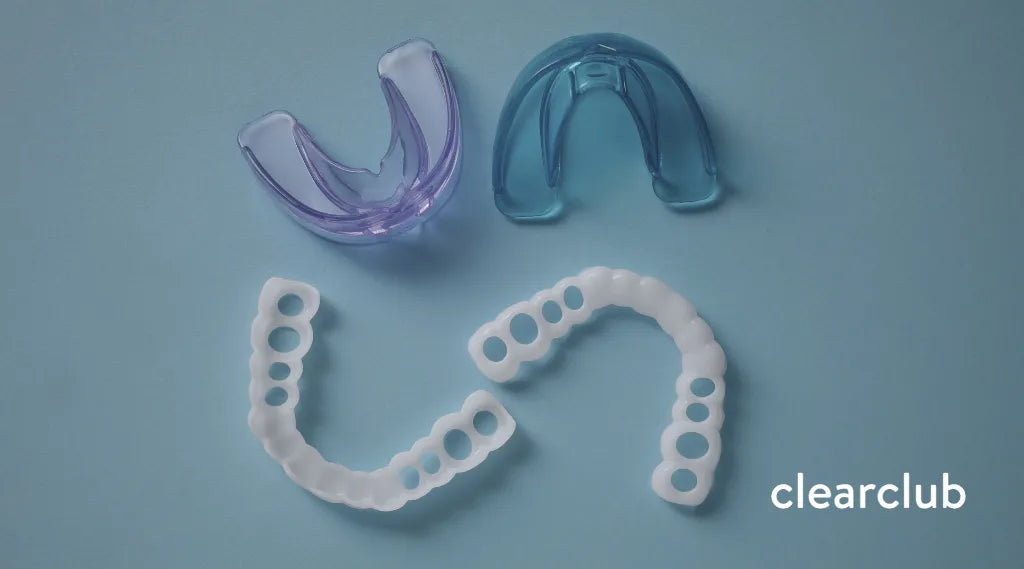
Sleep Apnea Night Guards v.s Bruxism Guards: What's the Difference?
Share
It's common to confuse a sleep apnea mouth guard with a bruxism night guard, especially if you're just starting to learn about these oral health conditions. The key is understanding what night guards for sleep apnea and bruxism actually do—and how the right one can help you manage each condition.
In this blog, we'll explain the differences, show how a night guard for teeth grinding and a mouth guard for sleep apnea work, and highlight how ClearClub's custom night guards can support those dealing with teeth grinding, jaw pain, or even mild sleep concerns.
What is a Sleep Apnea Night Guard?

- Mandibular Advancement Devices (MADs)
- Tongue-Retaining Devices (TRDs)
According to the Sleep Foundation, these appliances are crafted to keep your jaw from falling backward and help position your tongue forward—two functions that prevent airway obstruction and make it easier to breathe during sleep. Although sometimes referred to as mouth guards, these devices work very differently from bruxism guards.
The Cleveland Clinic also notes that prescription-free sleep apnea night guards, such as boil-and-bite options found in pharmacies, may provide some relief—though their fit and durability are limited. For lasting comfort and effectiveness, custom night guards remain the more reliable option, since they're designed to match your bite and last longer with proper care.
What is a Bruxism Night Guard?

A bruxism night guard is basically a dental night guard for teeth grinding and clenching. Think of it as a cushion that nestles between your teeth, taking the pressure off your jaw when you grind at night. This simple barrier can make a big difference, helping prevent chipped teeth, enamel damage, and even jaw soreness. Bruxism mouth guards are generally classified into four types:
- OTC or Stock mouthguards
- Boil-and-bite mouthguards
- Dentist-made mouthguards
- Direct-to-consumer custom mouthguards
Stock and boil-and-bite versions are the cheapest and easiest to buy, but because they're pre-made, they don't always fit well or last very long. That's why people with more serious teeth grinding usually go for a custom option—whether it's from a dentist or a company like ClearClub—since those are more comfortable and provide better protection.
Want a deeper dive into bruxism night guards? Check out this guide: The Truth About Bruxism Mouth Guards: Do They Actually Work?
Sleep Apnea Guard v.s. Bruxism Guard: Which Do You Need?
Think of it this way: one guard helps you breathe, the other protects your bite. Understanding their purpose—as well as where they overlap—makes it easier to know which one is right for you. The table below features they key differences and similarities between sleep apnea night guards and bruxism guards.
| Category | Sleep Apnea Guard | Bruxism Guard |
|---|---|---|
| Design and Fit |
MADs: Two splints connected together; move the lower jaw slightly forward. TRDs: Use suction to hold the |
OTC (Stock): Pre-formed, worn as is; least adaptable. Boil-and-Bite: Softened in hot water, then bitten to mold around your teeth; moderate fit. Custom-Made: Lab-crafted from dental impression; precise fit, available in different thicknesses and colors. |
| Who's It For |
Individuals suffering from sleep apnea symptoms such as:
|
Individuals suffering from bruxism symptoms such as:
|
| Cost |
MADs: $300–$2,000 TRDs: $50–$200 |
OTC (Stock): $15–$40 Boil-and-Bite: $25–$60 Direct-to-Consumer: $100–$200 (ClearClub offers night guards starting at $95) |
| Replacement Frequency | Replacement needed every 1–5 years, depending on wear and care. | Recommended replacement every 3–6 months, or sooner if damaged. |
If you're interested in getting a ClearClub night guard, check out this guide first. It will help you compare types, costs, and find the one that fits your needs: ClearClub Mouthguards: The Complete Guide to Types, Costs & Choosing the Right One
ClearClub Night Guards: Bruxism Protection and Sleep Apnea Support
Even though the American Dental Association (ADA) recognizes dentist-prescribed oral appliances as the standard for managing sleep apnea, ClearClub's custom night guard for teeth grinding can also provide supportive relief for those with sleep apnea symptoms. By lessening teeth grinding—a condition that often coexists with sleep apnea—our night guards help promote more comfortable and restful sleep.
Frequently Asked Questions
❓ Is a bruxism night guard the same as a sleep apnea mouth guard?
No. A bruxism guard protects your teeth from grinding and clenching by acting as a shield against the pressure of your jaw. In contrast, a sleep apnea mouth guard works by adjusting the position of your jaw or tongue during sleep to help keep your airway open.
❓ Can a night guard help with sleep apnea?
A standard night guard does not treat sleep apnea itself. However, it can help reduce teeth grinding, a symptom that often coexists with sleep apnea, which may in turn improve overall sleep comfort. On the other hand, sleep apnea oral appliances such as mandibular advancement devices (MADs) and tongue-retaining devices (TRDs) are recommended by dentists or specialists to treat sleep apnea.
❓ How much do bruxism night guard and sleep apnea mouth guard cost?
The cost of a bruxism night guard varies by type. Over-the-counter options typically range from $15 to $60, while dentist-made custom guards can cost $300 to $1,500. ClearClub offers a comparable alternative to dentist-made guards starting at $95. In comparison, sleep apnea oral appliances can range anywhere from $50 to $2,000.
Looking for something else? Check our full FAQ section


